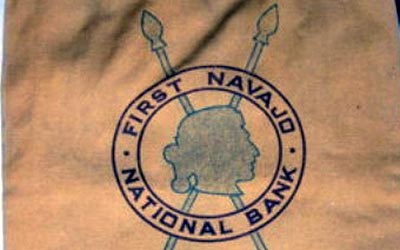
50 Years Ago: Audit haunts Nakai

First Navajo National Bank logo on a canvas bank-deposit bag that showed up in 2014 for sale on eBay. The bank had branches throughout northeastern Arizona before being sold to Wells Fargo in 1970.
People who saw the front page of the Dec. 17, 1964, issue of the Navajo Times probably thought at first that the administration had finally gotten its act together and managed to bring economic development onto the reservation.
“Unemployment at low point” was the headline on the paper’s front page and the story was about the unemployment rate for the month of November going down to less than 5 percent.
The problem was that the article was about the national unemployment figures, which had nothing to do with the unemployment problems on the Navajo Reservation, which were maintaining a level of between 50 and 60 percent throughout the 1960s and to this date is still hovering between 45 and 50 percent.
The reason for the story? It promoted Lyndon Johnson, who Chairman Raymond Nakai supported in the recent election as did the Navajo Times.
Speaking of Nakai, the early days of December did not bring him good news. In fact, it could have been the worst news of his entire eight years in office — except for the news in 1969 that the man he brought back from California, Peter MacDonald, to help him solve tribal problems was planning to run against him in 1970.
The news in 1964 came from the tribe’s external auditors, Peat, Marwick, Mitchell and Co.
The auditors just submitted their 56-page report on the tribe’s financial condition as of June 30, 1964, and it was, to say the least, shocking. “Unless steps were taken quickly, the tribe’s internal control would collapse,” it said.
The auditors found problems in a number of departments, with department heads ignoring proper procedures and unauthorized expenses being paid without following normal accounting procedures.

First Navajo National Bank logo on a canvas bank-deposit bag that showed up in 2014 for sale on eBay. The bank had branches throughout northeastern Arizona before being sold to Wells Fargo in 1970.
One of the findings was that the tribe had placed $1 million in the First Navajo National Bank without informing the tribe’s controller. The first he had heard of it, according to the report, was when the auditors brought it to his attention that the money had been taken out of a savings account in another bank and placed in the tribe’s checking account in the bank that the Navajo Tribe had helped establish.
Charles Goodluck, responding to charges from members of the old guard who leaked the audit report to area newspapers, said that the funds were put in a checking account in error.
Upon learning of the error, Goodluck said, the money was placed in a time-deposit account in the bank.
Instead of addressing the numerous problems that the audit found occurring during his first year as chairman, Nakai decided to cite past reports that came out during the administration of his predecessor, Paul Jones.
For example, in 1962, Nakai said, the tribe purchased a utility Jeep wagon for the tribal rangers department directly from a member of the tribal council, Sam Day III, without getting bids from anyone else or checking to see if the bid was reasonable.
He reported allegations that money was given from the chairman’s office — some $2,800 — to members of Congress whose districts laid within the reservation boundaries.
There were also allegations, Nakai said, that Jones approved payments for legal work from law firms in connection with the various claims cases despite the lack of justification that the work was done to benefit these cases.
Nakai basically used the argument that there may be irregularities under his administration but they were no worse and maybe even a little better than the irregularities that auditors found during the Jones administration.
This, of course, didn’t stop the old guard, all of whom were staunch supporters of Jones, from blasting Nakai every chance they got.
Nakai finally called on MacDonald, who was brought on board to solve some of the financial problems within the tribal government.
MacDonald said he was glad that the report was issued to the tribal council because “it truly confirms what I have been telling the tribal council all along.”
The problem, he said, was not what the report said but how the outside media was handling it.
“I am sorry, however, to see how the report was handled by the press which is only a detriment and not in the best interests of the Navajo people,” he said.
He said he didn’t believe the stories in the press were “complete enough for the public to understand the total problem which confronts the tribe.”
He downplayed the problems, saying these were the kinds of problems that any society “such as ours” faces when there is as much growth as has happened in as short a time as Nakai has been in office.
He pointed out that he has gone before the various committees of the council and the council itself about the problems going on within the tribal departments. “For instance, I have mentioned the alarming situation in the lack of controls of our financial activities,” he said. “I have also brought out the fact that we need competent, qualified and well-experienced personnel in key positions to assist the tribe in developing necessary controls without our tribal organization.”







 Highway 264,
Highway 264, I-40, WB @ Winslow
I-40, WB @ Winslow